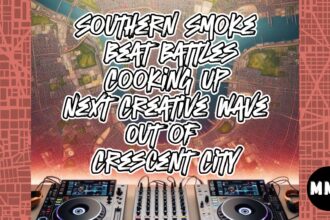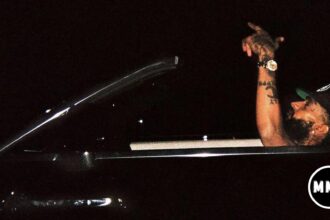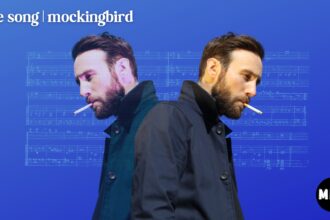In my first two articles with Music Movies & Hoops, I basically explored my entire life story and current struggle to find my place in the music world. Not only did I have to ask myself how I got here, but what am I doing, and why?
These questions are constantly circulating in my head…so much so, that I’m tired of thinking about them for myself. So, I figured I’d start asking other people their stories.
I’m fascinated with how people got to where they are musically. There is so much more beyond just performing and teaching—the areas I feel most comfortable in. The more musicians I meet, the more I realize how unique music truly is to each individual. What about music speaks to them, how do they utilize it in their life and career, and what’s their backstory?
There are also many facets of music that I have either just dipped a toe into or flat-out know nothing about. One such title is being a “Bandleader.” I play in other people’s bands, I help arrange and even write a few songs, but I’ve never really had the experience of being the singular beating heart of a musical project. This led me to Micah Motenko, bandleader for funky-soul band Motenko, based in Austin, TX.
Micah is not only a bandleader, he is also a songwriter, instrumentalist, and vocalist. In this interview, Micah dives into what he does as a musician, how he got there, where he is going, and how music feeds his soul.
As a musician, what exactly do you do/what do you consider are your “job titles?”
As a bandleader, I schedule rehearsals, book shows, review audio from previous shows and identify things that need improvement, I hire subs, keep the Google Drive folder organized, make charts and audio demos, schedule photo shoots, make content for promotion, plan next phases of the band and chart a course, pitch music to radios, and arrange and produce songs. There is always more stuff than I have time for.
I’m also an instrumentalist—I play keyboard, mandolin, and sing background vocals. I do studio work and live “side-guy” work [play as a hired musician for other people’s bands]. As a songwriter, I write songs I feel aligned with, meaning I appreciate them from a structural point of view and are songs I would like to listen to. I write songs I feel good about singing. I mostly write for myself, but I’d consider writing for other people.
I’m working on becoming more of a producer—I would like to add this and am beginning down this path.
What things have brought you to this current trajectory?
Two things happened—number one, I had a job as a teacher with full-time salary and benefits out of college. My job was great, but I didn’t feel fulfilled and I had a strong feeling that if I didn’t try to do music, I would regret it…so I quit that job after a year.
The second thing that happened is that right around the time I decided to quit my job and move to Austin, my mom got diagnosed with stage IV lung cancer and died nine months later. This experience gave me some personal turmoil and that turmoil happened to be most soothed by music and touring. Playing shows was medicine for that. It cemented the fact that life is short and you need to do what you love. I’ve never loved anything more than making music, and I feel like I am good at it. After my first two years of being in the Austin music scene, I haven’t looked back.
You started out in the music scene as a “side-guy.” What lead you to create a band?
I would have been happy playing keyboard and singing background vocals in a band that I loved. But, that band didn’t materialize and I got tired of waiting for it to come…so I made it myself. That was the reason why I started my own band—I wanted to be in a band that I was in love with. That didn’t happen for a year, I was impatient, so I decided to do it myself. I only had a few songs at first; most were covers.
I started going to other people’s shows and meeting them. I wanted to play with people I thought were good and I already felt like I would get along with. Eventually, I started finding people that wanted to play with me.
The vision of the band was very intentional. I love R&B and I love classic rock. I wanted to figure out where those things overlap, and in a way that I can feel cool playing these songs. How would I play keyboard in the bands I wish I was in? I don’t play guitar, so I had to figure out what I can realistically play on keys that I think is cool. I settled on what I think is the coolest keyboard-centered music, which is reminiscent of late ‘60s/early ‘70s soul music. Some is soul, some is rock.
Songwriting—what’s your process?
Start with a groove. Then I move on to chord changes and a beat as one thought. Sometimes this contains melodic motifs, sometimes a rhythmic motif, sometimes both. Then I will improvise a melody over that. Then I do some gibberish with a rhyme scheme over that…then I’ll improvise another section. I keep everything as close to improvising as possible because that yields the best results for me. I only tinker a little afterward. I will come up with 2 sections, then come up with a form…some songs need a third section. My process basically boils down to “what is naturally gonna happen now?” It needs to feel intuitive. Lyrics always come last.
What is your unique niche?
My taste. I think my taste is a little closer to the pop arena. I’m not a shredder or a virtuoso. Instead, I am the person who tries to play the right notes in the right places. I hope to be that. It’s not something that’s a given, but that’s what I’m shooting for.
What are your inspirations/what made you want to take this on?
Musically, I admire people who play simple and catchy, and groovy music, meaning the music grooves well. It bumps and makes you wanna nod your head and tap your feet. Good pop is an inspiration. Nat King Cole, Sly Stone, Ray Charles, Professor Longhair, Jimi Hendrix…there are more, but the point is these people had some type of pop sensibility and could put that lens over the genre they were playing in. That’s the juncture I want to sit at.
I try to follow people who are independent artists and have had commercial success and have had commercial success with music I like. Their music has integrity—people who are making music that is an expression of their soul, rather than a reflection of their pockets. Those are the people I try to follow, and I’m still learning what it means to be an “industry person.”
What do you feel are your creative outlets in this career?
The music, songwriting, performing, playing; anything that isn’t the business side of things is a creative outlet to me. Even recording sessions of music I might not enjoy as much—it’s still creatively fulfilling.
Creative marketing strategies and social media are important in the industry too, and I’d like to be more creative on those sides of things.
What do you love most about what you do?
The payoff. The payoff is how social it is, the final product of a recording, the experience of playing live, which is two things—love and validation we get from the crowd, and the electricity of playing with a good band. Playing with a good band is probably number one. That’s the most important thing; I want to play in a band that I love. If everyone is grooving together really well, that’s the most important part of playing in a band to me—when everyone is locked in.
Is there anything you wish you could do differently?
I wish I could compartmentalize a little easier—I wish it was easier for me to let go of my emotional attachment to things. It would let me do certain things quicker—sending out pitches, sending booking emails, doing outreach tasks. Self-promotion and band promotion are tough. I tend to approach it from a similar place of writing songs…I wait until I “feel it.” I wish I didn’t feel like I needed to be emotionally invested in the business side of things, and just do them.
This also applies to arrangement. Trying to get my working process more efficient; it doesn’t always need to be an emotional attachment.
What other avenues of music do you hope to explore in the future?
Production. Production is doing whatever is necessary to take a song and turn that song into a good and successful recording. Sometimes producers arrange, sometimes they do premixing (sound design). Sometimes they do songwriting; example: this song needs a pre-chorus or doesn’t need a bridge.
Producers are casting directors for the recording session; they can choose musicians for a session. One example would be, “this is a cool song—there should be a guitar part in here, and it should be played on a hollow-bodied guitar with humbucker pickups that are plugged into a compressor that brings out its character…and I know a guy who does that style.” That’s producing. I’d like to build a studio. I’d like to do this for other bands in the future, I want to produce for my own band now.
What do you think the future of music is?
Online ubiquity. Social media, meme culture like TikTok. Live experiences like festivals. A show has to be an event—it can’t just be “come see us play.” There has to be some unique thing that’s happening. I’d rather just have a show, but it seems like people want as much of a unique experience as possible. People want to watch live music but have everything else be a vibe too. The show is the entire experience, all the way up to how people feel when they buy the ticket, how they feel when they walk through the door.
I wonder about the future of the economics of music too. It is subject to the same inequality as the rest of society. You’re either broke or you’re rich. My goal is to be middle class, so we will see how that goes.
What about your path connects you with the overall human experience?
I just so happened to take a left turn onto a path that was completely guided by my dreams. I’ve stayed there since. I’ve been lucky enough to stay there since, but I do believe it is a choice. I’ve been lucky enough to be put in a position where I felt comfortable making that choice…but I believe it’s a choice anyone can make. There are plenty of people who have done that. I have an inherent connection with anyone who can describe what they have done in a similar way, whether it is starting a business or something else. I connect with anyone who has had to take a leap of faith to get to where they are; I’ve got a lot to talk about with those types of people.
Playing music is ultimately about charging their air—or channeling emotion or vibe, or a feeling.
Every so often at a show, someone will tell you that they are vibrating at that frequency.
It strikes a chord with them. That is an incredible feeling and a spiritual experience. It’s rewarding to connect to humanity in that profound way. Playing music and writing songs is about that—finding connection with people’s human experience. Often you can’t put it into words, but if you create art that resonates with people, that means the art is speaking to their human experience.
Thank you for sharing with us, Micah!
Before I sat down and talked with Micah, there were things about him that I already admired—the commitment to his music, his drive to make it really work as his full-time job, along with his musicianship. He had a specific vision and just did it. He made exactly what he wanted; that which allowed him to feel connected to music in a personal and soul-searching way.
Although I live a different musical life than him, I relate to the journey of finding something that truly feeds you, and that when we wait around to find this, it won’t happen. We have to make it happen for ourselves.
“…connect to humanity in that profound way.” Sometimes it’s difficult for me to describe exactly what it is about music that is so addicting, but I think Micah finds it here. We connect more with ourselves, with other musicians, and with the world in general through music…not just on a surface level, but on a truly heart-melting and mind-numbing level. This is why I keep doing what I do, and hearing this from people like Micah keeps me going.









